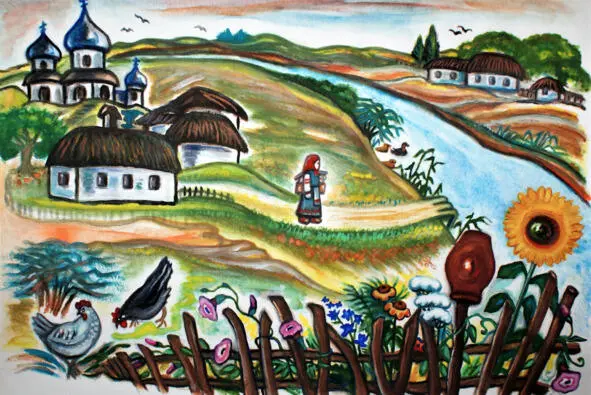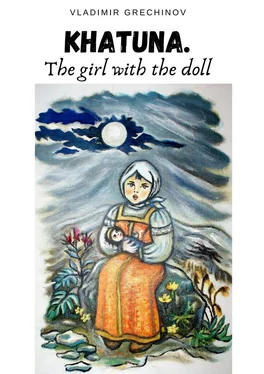KHATUNA. THE GIRL WITH THE DOLL
VLADIMIR GRECHINOV
Dedicated to my daughter Victoria.
© VLADIMIR GRECHINOV, 2021
ISBN 978-5-0055-1171-3
Created with Ridero smart publishing system
CHAPTER 1. PETROVSKOYE VILLAGE
This terrible story happened at the end of the XIX century in the village of Petrovskoye, Stavropol province, in the south of the vast Russian Empire. This village was lost in a steppe area, surrounded by mountains and hills with streams and beams overgrown with dense forest. Mostly Cossacks, gypsies and other newcomers who arrived here long ago in search of refuge and a better life lived in Petrovskoye. More than a dozen years passed before the village grew: adobe huts covered with straw and dry reeds, with small windows and a necessarily carved porch appeared here and there, gradually forming long, though not very slender strings. Over time, they grew into wide streets, buried in the lush greenery of trees and shrubs that planted caring villagers around their huts There were no special attractions in Petrovskoye, except for a large white-stone church – the ringing of its bells was usually heard for many miles, and a colorful market, which everyone here called in the southern manner – the bazaar.
On weekdays, the local people were busy with something: some with hard peasant labor in the field, and some with no less light housework, looking after the children, whom there was a lot of in the local families, and caring for the farm. On Sundays and holidays, people put on their best clothes and in the morning went first to the church, and then to the bazaar.
The trading rows were not only a meeting place for relatives and acquaintances – many came here, so to speak, to show themselves and to look at others. This was especially true of girls: local beauties at a conversation seemed to accidentally boast of new clothes to each other, while they loudly laughed and glanced furtively at the handsome lads walking in the bazaar. Here, boys scurried around in dirty tatters everywhere: some tried to earn some money honestly, attempting to bring something to sellers or visitors to the bazaar, while others simply looked for something to steal from inattentive and slow-moving buyers.
The bazaar itself was a square with the trading rows, where they sold everything what was needed. Eh, what wasn’t there – fruits, vegetables, milk, eggs, meat, fish, hay, firewood, coal, clothes… They traded mainly from carts and wagons, while some placed their goods right on the ground.
The wealthy merchants and other successful businessmen had their own covered shops with large signs on which the names of the artels 1 1 Artel was any of various cooperative associations in the Russian Empire.
were flaunted. Such rich men allowed themselves to hire salespeople and barkers who loudly bellowed at the whole bazaar.
The owners themselves spent almost the entire market day in the immediately located inn, on the verandah of which they gathered at a large long table with a samovar. 2 2 Samovar is a big metal container used in Russia to boil water for making tea.
Being business people, merchants argued about something noisily, made bets and big deals by their standards. Meanwhile, lackeys rushed to the table with sturgeons, dumplings, overseas fruits and other dishes. Finished with business, the merchants celebrated, had fun, but sometimes still looked at their pocket gold watch and watched hired salesmen, giving them instructions through the clerk or through the boy footman, who hung around the Inn.
In a word, life in the village was boiling on Sunday market day. It was a kind of holiday, after which the streets were empty, and on the morning of the next day the week of heavy peasant workdays began again…

Once on such a Sunday a local craftsman Nazar was about to go to the bazaar. He and his wife Galina and two daughters, Ulyana and Vasilisa, eight and six years old, lived on the outskirts of the village, in a hut standing alone on the slope of a high hill. They had no special wealth: a small piece of land, a horse, chickens, and goats.
Nazar basically made his living by blacksmithing and tinsmithing. Local Cossacks and peasants ordered from him horseshoes for horses, various tools and all kinds of utensils. In addition, Nazar had an oral agreement with two traders. One of them – Pantelei – took orders from the local rich, of whom there were many in the surrounding villages and farms. They ordered mainly tin roofs, drainpipes for stone houses, monograms and weathercocks. Pantelei, in turn, selected workers who could perform this work qualitatively so as not to offend a valuable client, and as cheaply as possible so as not to offend himself. The second regular customer of Nazar was Klementiy – the clerk of the merchant Ipatiy Petrovich Volobaev, a very rich man by local standards who had several shops in the bazaar with various goods, including French chocolate that was unusual for those places, which he delivered by a long way directly from France. At the same time, Volobaev was also listed as a leader of the local merchants, for which he enjoyed honor and respect in the village. Nazar usually brought Klementiy bright tin boxes of different sizes with coinage on the lids, in which then the chocolate was packed. Each box had an embossed stamp with the name of the artel of the merchant Volobaev.
Getting up early in the morning, Nazar first fed his livestock and had breakfast with his family, and then harnessed a horse and put in a cart all the goods he had made to order for the week. The smith was already about to hit the road, when suddenly his eldest daughter Ulyana ran out onto the porch.
«Daddy, daddy, take me with you! I also want to go to the bazaar! I’m bored of sitting at home.»
Nazar stopped his horse and frowned at her, «You don’t have to hang around in the bazaar. Stay and help mom around the house!»
«Daddy, please, take me with you,» persisted Ulyana. «I’ll do all the housework afterward.»
Nazar glanced at his wife, who only shrugged, as if leaving the decision to her husband. He smiled at his daughter and waved her hand, allowing her to get into the cart. Then, pulling the reins, he shouted to the horse, «Go! Go, dear!» and the cart, creaking old wheels, rolled down the dusty, bumpy slope, overgrown with creeping shrubs…
At the bazaar, Nazar first went to Panteley. Panteley was a bald little man of small stature with a groovy, at first glance, cheerful character and running eyes. But behind this gaiety, in fact, was a dodgy cunning and the desire in no way to lose his interest.
Seeing an artisan approaching the trading rows, Panteley perked up, «Oh, Nazar! I’ve been waiting for you for a long time. Well, come on, come on, and show me what you brought! The clerk of the merchant Kabanov has several times wondered when they will be pleased to receive their order.»
«Well, I did everything as I promised,» Nazar said, throwing back the old cloth that covered the goods.
In the cart were forged monograms made for the new estate of the merchant Kabanov, indicating his well-known name in the local area, a weather vane on the roof, repeating the shape of a rooster about to jump off a pole, and drainpipes decorated with carved flowers.
Panteley looked at the goods with a snide smile and, screwing up his cunning little eyes, he began to count everything carefully, at the same time trying to find at least a small defect in order to have reason to pay as little as possible. Finding no flaw, he decided not to back down anyway, «Nazar, I will buy all this from you for twenty rubles!»
Читать дальше













